Idaho National Guard memorializes WWII Medal of Honor recipient
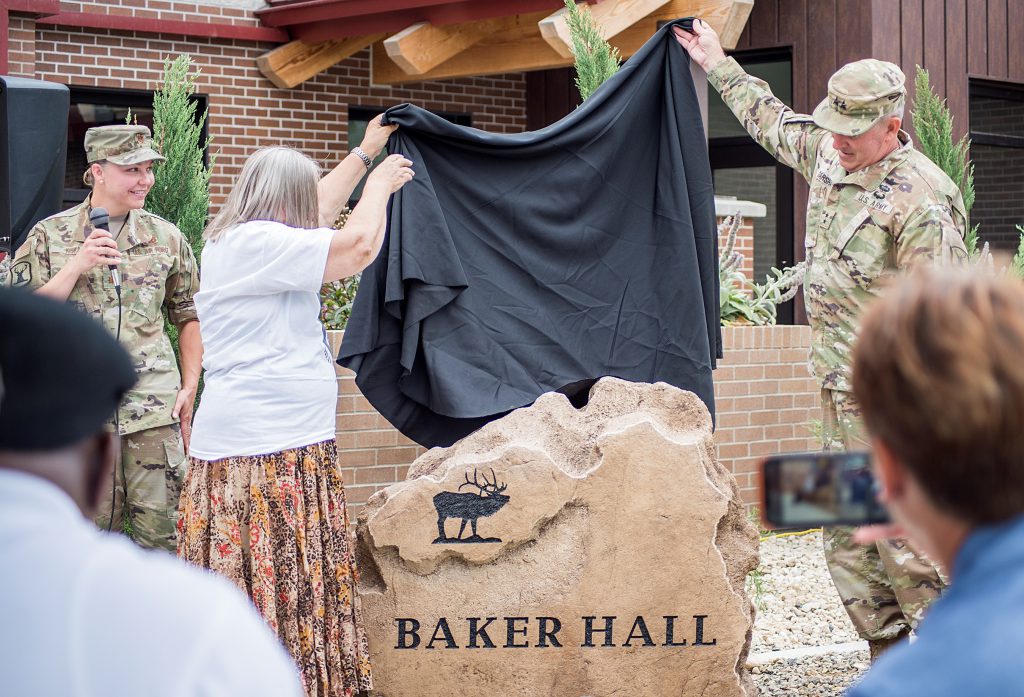
Idaho Military Division Public Affairs/Crystal Farris
The Idaho National Guard dedicated its newest barracks in honor of Medal of Honor recipient U.S. Army 1st Lt. Vernon Joseph Baker on Gowen Field, Tuesday.
Baker was one of seven African Americans awarded the Medal of Honor for service during World War II. He received the award nearly 50 years later for his extraordinary heroism on April 5 and 6, 1945, while in Viareggio, Italy. The award is the nation’s highest and most prestigious military decoration.
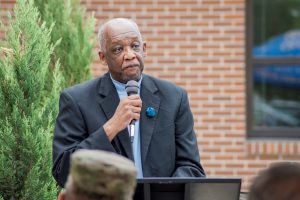 “I’m thankful that on this day, we will create a lasting legacy in the name of 1st Lt. Vernon J. Baker, Medal of Honor recipient,” said Jerome Mapp, former Boise City Council member and Caldwell planning and zoning director. “Those who will enter into this building will have the opportunity to learn about Baker, his leadership and the sacrifices he made.”
“I’m thankful that on this day, we will create a lasting legacy in the name of 1st Lt. Vernon J. Baker, Medal of Honor recipient,” said Jerome Mapp, former Boise City Council member and Caldwell planning and zoning director. “Those who will enter into this building will have the opportunity to learn about Baker, his leadership and the sacrifices he made.”
Baker joined the Army in 1941 and later attended Officer Candidate School to earn his commission as a second lieutenant in 1943. The following year, he deployed with the 92nd Infantry Division to Italy. On April 5, 1945, Baker led 25 African American infantrymen through a maze of German bunkers and machine gun nests to attack Castle Aghnolfi, a German stronghold.
He lost 17 of his men during the battle. However, Baker destroyed various enemy installations, personnel and equipment during the attack. The next night, he volunteered to continue the advancement of a battalion through further enemy minefields and heavy fire.
Baker earned the Distinguished Service Cross for his actions, the Army’s second-highest award for bravery.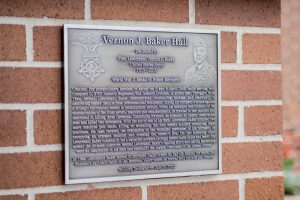
In the early 1990’s the Department of Defense and the U.S. Army initiated an investigation that determined a climate of racism had prevented African American service members from receiving proper recognition for acts of courage during World War II. In total, seven African Americans, including Baker, were later approved to receive the Medal of Honor.
Baker was the lone survivor of those seven individuals on Jan. 13, 1997, and the only African American to ever personally receive the award for service in World War II, when he accepted the Medal of Honor from President Bill Clinton at a ceremony in the White House. He was 77 at the time.
After Baker retired from the service in 1986, he moved to Idaho to pursue his love of hunting. He later met his wife Heidy, who he lived with in their St. Maries home until Baker’s death in 2010 when he was interred at the Arlington National Cemetery in Virginia.
Mapp said in 2020 he had wanted to recognize an African American from Idaho and remembered meeting Baker in 2000 during an event at the Idaho Black History Museum. Mapp thought Baker was worthy of recognition as an Idaho citizen and Medal of Honor recipient and requested he be memorialized by the Idaho National Guard.
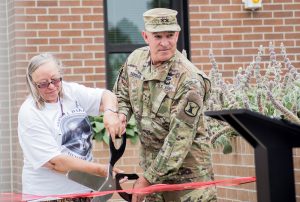 Maj. Gen. Michael Garshak, adjutant general of Idaho, said the organization wanted to honor Baker in a lasting way, where other service members could benefit from Baker’s accomplishments.
Maj. Gen. Michael Garshak, adjutant general of Idaho, said the organization wanted to honor Baker in a lasting way, where other service members could benefit from Baker’s accomplishments.
“Vernon Baker is a genuine American Hero,” said Garshak. “Not only for his heroic actions on the battlefield in World War II, for which he was awarded the Medal of Honor, but also because of his unfailing determination to put honor and country above all else.”
Construction of the barracks started in April 2020 and took three years and approximately $8 million to complete. It provides temporary lodging for up to 156 personnel with 39 private rooms and a shared dayroom.
It is the first building on Gowen Field to earn a gold certification in Leadership in Energy and Environmental Design; the second highest rating of four certifications that verify a facility’s green features. The Vernon J. Baker Hall earned its LEED rating through various features including integrated ground loop heating and cooling systems, low flow fixtures, sustainable building practices and sustainable landscape features.
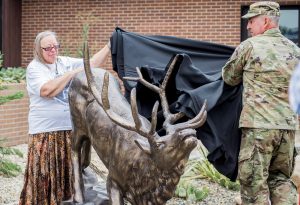 Heidy, who still lives in St. Maries, spent the night in the barracks prior to the dedication.
Heidy, who still lives in St. Maries, spent the night in the barracks prior to the dedication.
“It’s wonderful to have this building dedicated to my husband and a great honor for our family,” she said.
Outside the barracks is a stone that reads “Baker Hall,” a statue of an elk symbolizing Baker’s love for hunting in Idaho, and a plaque embedded into the bricks of the building entrance. Inside the building is his Medal of Honor citation and a brief history and biography of Baker.
 Official Government Website
Official Government Website